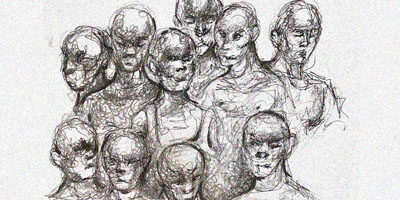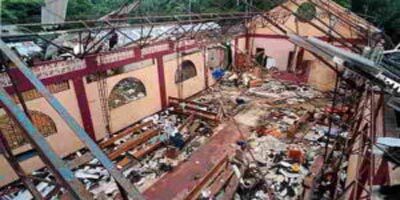Mading Ngor was one of the “Lost Boys” of Sudan who fled the infamous massacres of Darfur. He left his village in 1991, when his father was killed. He eventually arrived at a Kenyan refugee camp in 1995, where he remained until he got a visa for Canada in 2001. He went to high school in New Westminster, B.C., studied journalism at Edmonton’s Grant MacEwan University, and then earned his BA in Professional Communication at Royal Roads University in Victoria, when he co-founded a news website, New Sudan Vision. After a brief period working as a freelancer for the Calgary Herald in 2011, Mading returned to South Sudan and became a radio journalist on a popular morning show called Wake Up Juba! Today, he is an international correspondent with Reuters and The Huffington Post, as well as a production assistant with the BBC.
Growing up during the civil war and fleeing Sudan
You were born in Bor, the capital of Jonglei state in 1983. What was your childhood like?
My people are cattle rearing, so life around me when I was young was all about cattle because that’s the Dinka tradition. Even my name Mading is the name of a bull and most of the Dinka names are all about cattle. So I used to take care of the cattle, used to swim by a nearby lake and go hunting with my dog. To me it was a normal childhood. But that all changed when the massacre in 1991 happened in my village and changed my life irretrievably.
We were forced to flee on bare feet. When I say ‘we’ I mean my mother, siblings and other relatives. We ran to the bush, hiding and running away from the enemy. There was loud sound everywhere and we just kept on running. My mum was our guide and we ate wild fruits because we had no food. We were begging, depending on the generosity of others. We came back to Bor and it was a ghost town. Everywhere you found dead human, dead cow. Everywhere you went there was stench, it was just unbearable.
As an eight year old, what was going through your head at that point?
That death was imminent, death was pervasive. We were running for our lives. It was about survival, about escaping and trying our luck. We didn’t know which place was safe because the enemy was shooting everywhere. So we kept on running from this bush to the next bush. And my God, how many children were abandoned? Because they cry and if a mother loves her baby, she will put them in a separate bush and sometimes they just get left there.
Arriving in Canada
In 2001 you secured a visa for Canada. You studied journalism and earned your Bachelor of Arts in Professional Communication at Royal Roads University. Why did you decide to go into journalism?
I went into journalism to champion my story, to tell the world about this hidden massacre. But beyond that, it’s
about being a voice and highlighting what nobody is highlighting. It’s to tell the truth about my world. In those
days, when the world was raging, there were so many abuses that people never knew about. So that’s part of my motivation. I figured that journalism was very powerful. You can share your story with the rest of the world and, as Fidel Castro once said, without internationalism there is no humanity. And it’s true. Without journalism, there is no humanity.
While still a student, you contributed to major media outlets in Canada and established new Sudan vision, an online news site. Would you say you were seeing Sudan’s issues through new Canadian eyes?
I’m not really sure what Canadians’ eyes are. All I know is that Canada has empowered me to naturally champion my cause and facilitated me to get the tools to stand up for myself.
I started New Sudan Vision with my friends in 2006. This was a year after the Peace Agreement was signed that ended two decades of civil war. We were seeing a population that was scattered all over the world and saw the potential of the internet, the fact that it cannot be easily regulated by the government. We wanted those voices to have an outlet because South Sudan is a country where there are many intellectuals, potential authors and journalists who died in the war. We wanted to capture that post-war eloquence. And the world would also see that we have stories of our childhood which was robbed from us.
Returning to South Sudan and present day
You returned to South Sudan in April 2011, just three months before the country’s independence. What was Independence Day like for you?
Sometimes when you have been longing for something and it arrives, it shocks you, it numbs you. You are emotionless because you don’t know what to think. It was very emotional when the flag of the republic came down and the flag of the new one went up. I was in tears when we sang our national anthem for the first time, and my mind went back to the days when we were hunted like dogs, like animals. Finally we were here in a new republic, with our own challenges, but at least those challenges were going to be faced in our own country.
What role do you think media should play for South Sudan’s development?
I think it should be seen in the context of nation-building because our country is not even a nation state. There’s no cohesion. Th ere are many tribes but there’s loose identity. I am a Dinka first before I am a South Sudanese. My identity can even go to the clan level. There is a lot of work that is needed to build this new country. There’s nothing that constitutes “South Sudanese-ness”. That coherent identity is not there. I am conscious about this every time I do my broadcast, every time I put my panels together. I have to make sure I balance it. So media should be a unifying force and should preach togetherness.
Reuters has described your journalism as edgy and hard-hitting. How would you describe it?
I went to school and learned about principles of journalism, objectivity and neutrality. But that’s not my world because in my world it’s about fairness, about doing the right thing. There is no objectivity, but I know there is fairness, and that is what is going to build a nation. In fairness there is moderation. It’s not so much about playing the opposition, it’s about being pro-people, pro-justice.
Reporters without Borders has ranked South Sudan very low on their freedom of speech index. Last year you were thrown out of assembly. How dangerous is your job?
The risks are inherent in any job; it’s a matter of degrees. I am fully conscious of the consequences. I can die doing my job; it’s something that I signed up for. But the goal is not to die. Th e goal is to stand up for what you believe in. We don’t have to pretend that South Sudan is like any other country. It’s a country that was brought about by the real sacrifices of the people. Where have we come from? Where are we going? Someone has to be able to ask those questions.
Nelson Mandela once said that a man must know what to live or die for. But if you haven’t found anything to die for, you have nothing to live for. If I die doing this then I’m prepared. South Sudan has yet to ratify key human rights treaties which would also reinforce free speech and other basic freedoms.
What needs to be done for these treaties to be reinforced?
The media law itself is not there. Media bills have been brought to the parliament; they have been debated
and died several times. Many attempts have been made and they never go anywhere. They would guarantee, at least on paper, freedom of speech.
Frankly speaking I don’t believe that the situation will miraculously change as soon as those laws are implemented but the laws would be a good start. Since we are building a nation, it should be a nation of rule of law. But before the laws are written on paper, they also need to be written in the minds of those people who implement them. The soldiers, the security officers, all the security organs, there’s a lot of work and awareness needed. They come from the bush and that bush mentality needs to change.
What can Canadians do, on a practical level, to help South Sudan?
It’s a difficult question, one that should be straightforward. Canadians are generous people; they are for common sense, for humanity, for justice. Canadians are about opportunity, about progress. And progress should be in the interest of everybody. I think the people of the world should press this new nation, and stand for human rights, for civility and democracy. This is a baby country and it should be the world’s baby.
Our independence belongs to us first and foremost. But it belongs to the world because when we needed shelter, we were given shelter. When we needed food, we were given food. When we needed, water, we were given water. And remember, without internationalism, there is no humanity. I am because you are and you are because I am.




Atem Nathan Riak Anyuon
Mading Ngor is doing a great journalistic work for South Sudan, he is fair in his work as he said, the challenge is to keep it up in the face of many pressures.I wish some investigative work is done on the so many issues of corruption that have befell our country.
Kennedy
Great article/interview but the infamous massacre Mading was escaping was in Bor not Darfur.